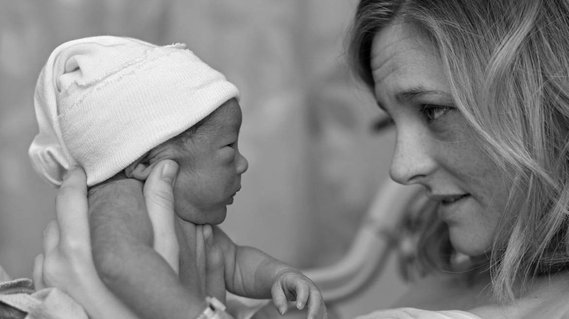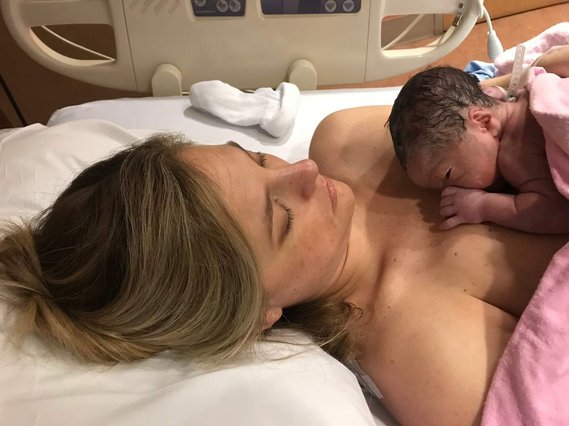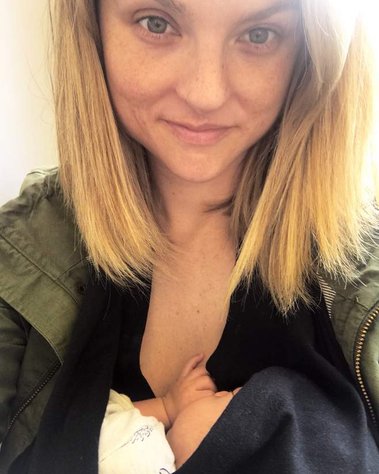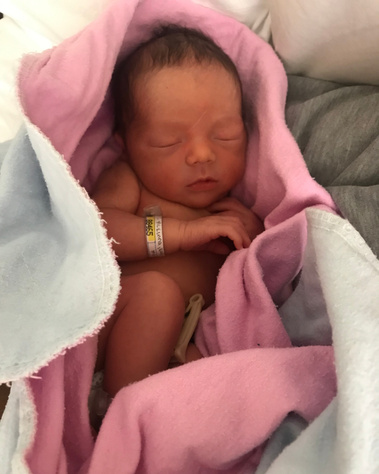Kate & Desmond
Kate McKenna often thinks about the 80-year-old version of herself. She imagines her present in her current life, quietly observing. Utterly amused by the memories evoked. Kate’s 80year-old self is strong and refined; all her fears worn away by the waves of life experiences that have washed over her. Her athleticism is still evident in her posture and gate, in the muscle memory that is triggered when she throws a ball to her grandchildren. Motherhood is also tightly woven into the fabric of her being, almost as if it was always there. And yet there were 32 glorious years of her life before her journey into motherhood began in the spring of 2019.
Kate’s Thursday morning alarm woke her at 4:30. Time to get to work and into hair and makeup for her on-air sports updates. Kate was on top of her game. Work was deeply satisfying and she poured herself into it wholly. The television and entertainment industry drew out the best of her talents. Three years prior, she had married the love of her life, another shining star in the industry. Together they were living the high life in downtown Toronto.
By the end of the work day, Kate was exhausted. It wasn’t until she stood still, which was infrequently, that the toll of being 36 weeks pregnant caught up with her. She walked home slower than normal that evening, stopping at the shoe stores along Queen Street to find something suitable for her baby shower that weekend. Kate noted the novel sensation of people brushing past her as they hustled down the sidewalk. She was feeling crampy, but nothing that a back massage and some trashy television wouldn’t be able to solve.
The transition into motherhood is different for every woman. For some women, the road begins long before the baby is born. Some women dive deep into a nesting phase, decorating a nursery, buying baby clothes, and exploring the hundreds of accessories their new family member may require. Others are delighted by the feeling of being pregnant, displaying their bump like a trophy of excellence. Kate’s experience was more inward and personal. Her maternal instincts were awakened by the sound of her baby’s heartbeat. She relished the fast and steady whooshing at every ultrasound appointment. Like it was their first primitive conversation. And there were a lot of appointments, a consequence of Kate’s double placenta. It turns out that about two in every 1,000 pregnancies involves the growth of a secondary lobe, medically referred to as a succenturiate lobe. Luckily, there were no major complications as a result of it for Kate.
Other than those moving moments in the dark ultrasound clinic room, Kate’s mind was miles away from motherhood. So when she got up from the toilet that evening, only to sense fluid running down her legs, she was confused, to say the least.
“DJ… Uh, can you come in here? I don’t know if this is pee or not, but I think my water just broke,” she said relatively calmly. DJ bolted into the bathroom like he knew exactly what to do. He surveyed the situation before instinctively dropping to his knees and examining the fluid puddling on the floor—by tasting it.
“It’s not pee,” he reported confidently.
Kate stood speechless. She wasn’t sure what was more shocking: the fact that her water had broken four weeks before her due date, or that her husband had voluntarily ingested a liquid which quite possibly could have been urine.
Kate knew enough to call the midwife, who instructed them to grab their bags and come into the hospital to get assessed. What bags? thought Kate. Kate was an over-the-top super-preparer, but the pregnancy Gantt chart clearly indicated the packing of a hospital bag wasn’t scheduled until week 37. She quickly grabbed hold of the situation and began shouting out instructions for DJ. Thank goodness she had already taken a trip to Walmart to purchase perineum cream and other products that had horrified her younger sister.
They hopped in an Uber and headed over to St. Michael’s Hospital. Things appeared calm on the surface, but inside, Kate was nervous. Hospitals were one of her least favourite places. The midwife had instructed Kate to count the baby’s movements on the ride over. This simply exacerbated her anxiety. Do very faint movements count? Do you count a long series of movements as two? Should you sound an alarm if you don’t feel any movements for a long stretch of time? Kate grounded herself by talking to her little one. “You okay in there, buddy?” she kept repeating, holding her belly.
They arrived at the hospital around 10:30 p.m. The place was packed—not uncommon for a Thursday night a tan inner-city hospital. The lighting was as shocking as some of the sights. People moved around Kate and DJ like they were invisible. They made their way to the 16th floor and scanned the Labour and Delivery registration area for their midwife, longing for a familiar face.
Finally, the midwife appeared and led Kate into a small assessment room that doubled as a storage closet. It was the only space available. It didn’t take much for the midwife to confirm that Kate’s water was broken. This baby was coming.
The buzzing in Kate’s ears seemed to intensify and drown out everything else. She couldn’t stop thinking about work. About how she had just left her desk. About all the loose ends. All the unfinished discussions and decisions. Kate’s mind bounced around to each one of them, like a ping pong ball refusing to lay still. Kate turned to her cell phone, clutched tightly in her palm. She began to text her boss to let her know she might not be in tomorrow. That’s when the midwife sensed it was time to intercept the ping pong ball. With a firm maternal demeanour, she looked directly into Kate’s eyes and said, “I need to let you know, you’re not leaving here without your baby.” In that moment, the room stopped spinning and reality began to sink in.
A couple of hours later, a room was finally freed up and Kate began to shuffle down the hallway with her Nike duffle bag in one hand and IV pole in the other. Unfortunately, the results of her strep test had not come back yet, so they had to administer antibiotics intravenously, just in case. DJ was dispatched to assemble a selection of snacks and manage the communication command centre.
The next two hours were highly uneventful. Kate still wasn’t experiencing the faintest pangs of labour. By 2 a.m., the decision was made to initiate an induction. The nurse warned Kate that contractions may come on quickly. The athlete in Kate convinced her she didn’t need an epidural. No pain, no gain after all.
Over the next four hours, Kate tried every trick in the book to progress her labour, from the bouncy ball to leaning over the bed to vigorous back massages. Kate was in agony. The physical reality of having her uterine muscles spasm strong enough to push a fully grown baby out of her cervix was beginning to take a toll. DJ was in full-on cheerleader mode. “You can do this, Kate. You’re tough. You don’t need an epidural,” he urged. Those words seemed to be the right thing to say. But all Kate heard was, “You’re a failure if you don’t do this without an epidural, Kate.”
At 6 a.m. the OB examined Kate. She was cold and unsympathetic. Kate could only assume she took pleasure in delivering the discouraging news. She was only 2 centimetres dilated. Kate could almost hear the sound of motivation escaping from her body, like air out of a balloon.
Shortly thereafter, a former high school classmate who happened to work at the hospital stopped by Kate’s room to say goodbye at the end of her shift. Astutely sensing Kate’s anguish, she said, “You know, there are pain meds for you, if you want them.” The words seemed to unlock the misperception of success she had been holding onto so tightly. She immediately initiated an epidural and reveled in the sweet relief of pain. She even got to take a nap.
The action didn’t pick up again until about 5:30 p.m. that Friday evening. The midwife seemed encouraged by Kate’s progress, so she decided to guide her through some practice pushes.Kate got it a little too quickly. The midwife immediately instructed her to stop pushing while she called in the second midwife and got ready for showtime. The athlete in Kate perked up. There was a clear finish line and she knew exactly how to charge hard.
DJ stood firmly in Kate’scorner, just outside the boxing ring. He alternated between the bedpan for her vomit and a cup stocked with vitamin water. Her midwife coached her to hold her pushes for 10 seconds, two in a row. Kate made it three.
At 6:26 p.m., Kate’s miracle entered the world. The midwife placed her son, Desmond, on her chest and she began to weep. “I’m so excited you’re here,” she whispered.
Given that he was premature, the paediatrician swept him away shortly after for a full examination. He was perfect. All 5 pounds 10 ounces of him.
The best moment of Kate’s life was interrupted by the OB, who was focused on Kate’s double placenta and the fact that it was not coming out. “I need to do a physical examination of your uterus,” she said matter-of-factly. “I’m not going to sugarcoat this. It’s going to hurt.” Kate’s thumb pumped the epidural button. If it weren’t for that, and the dizzying euphoria of seeing her baby’s face for the first time, she would have released a primal scream while the OB dislodged her placenta.
The dust began to settle later that evening as quiet fell over their shared hospital room. Kate kept looking at Desmond, swaddled tightly in his blanket. Is he still breathing? Is he still mine? she thought.
Childbirth carves out a new depth to your character and abilities. There is likely no other experience in life that changes you so dramatically in such a short amount of time. Standing in that moment is nothing short of shocking. The person you are post-delivery may not feel very different from the pre-baby version of yourself, but do not underestimate the magnitude of change that has ensued. Kate was now a mother.
On Sunday evening, DJ borrowed his brother’s car and drove his wife and newborn son home. His fatherly instincts kicked in immediately, as he shouted at every car on the road for driving far too recklessly.
As Kate stepped out of the car, she realized how much had changed in such a short time. Yet it was almost as if nothing had changed as well. As Kate pondered this conundrum, her 80-year-oldself watched with total empathy and began to cry tears of joy. She saw Kate growing, ready to live the heck out of life with her new playbook.




